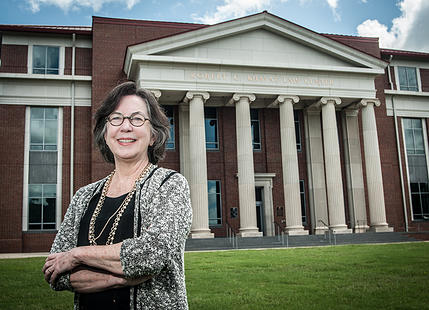
Most people who grow up in the Mississippi Delta say it is a special experience and while they may move away or travel far and wide once they’re adults; the Delta makes a huge impact on their lives and always holds a fond place in their hearts.
Professor Deborah Bell is the new interim dean of the University of Mississippi Law School and is no exception to that statement. Bell was born in Indianola and grew up on a farm in the Fairview Community about ten miles outside of town. She was the oldest of five siblings and her father farmed and her mother was trained as a teacher, but worked as a homemaker during her childhood.
“I liked living in a small town, but I loved living in the country,” Bell says. “Up until I was in junior high school, I spent most of my summers on the farm. I rarely went into town. When I was in elementary school, our family would go to the library every Friday. I would check out my supply of books for the next week, the library limited us to five each. I spent a lot of time sitting in trees reading books. My family belonged to a small country church — Fairview Baptist. I was the church organist until I graduated from high school. My best friend Jackie was the pianist and she was a much better musician and went on to teach in the field. I’m sure I missed some of the benefits of city life, but I don’t think I would trade a small-town childhood.”
Bell attended Lockard Elementary School and Indianola Academy as an adolescent and began her higher education at Mississippi College in 1971. During her early years at Mississippi College, she developed an interest in law and never looked back.
“I decided I wanted to go to law school during my freshman year at Mississippi College and never really changed my mind,” she says. “I worked for one year after college and saved money for law school. After graduating from the Ole Miss Law School in 1979, I clerked in Atlanta for Judge Elbert Tuttle, a Fifth Circuit Judge who drafted many of the federal civil rights decisions. Then, I worked for The Atlanta Legal Aid Society doing housing work.”
But Bell came back full-circle in her career when she was offered a position at the University of Mississippi Law School not long after her graduation.
“I was offered a teaching position in 1981, just two years after I graduated,” she says. “And I’ve been at the law school for most of the last 34 years, although I was a visiting professor for a semester at Ohio State and, later at Emory. I also spent a year-long sabbatical in Boston doing housing work.”
Her early years at Ole Miss were spent teaching traditional classes, but about ten years into her professional career at the university, she had the idea to start a clinical-type program.
“During the first decade at the law school, I taught commercial law, housing law, and property,” Bell says. “Then in 1991, I thought it would be great to start a clinical program at the law school so students could work alongside attorneys to represent low-income clients — using the cases as a teaching tool. Over the next 20 years, I spent about half my time in clinical teaching and the other half teaching traditional classes.”
In 1996, Bell shifted her classroom teaching focus to family law. In addition to teaching the course, she wrote a treatise, “Bell on Mississippi Family Law”. And she continued to work in the clinics as well.
“Over the last decade the clinical programs have grown, in great part to private donations from law school alums, including John and Renee Grisham,” she says, “to include ten or more different units including The Innocence Project, the Criminal Appeals Clinic, the Externship Program, Elder Law Clinic, Street Clinic, Child Advocacy Clinic, Housing Clinic, Transactional Clinic, MacArthur Justice Clinic, Tax Clinic, and MEdiation Clinic.”
In 2013, when Dean Richard Gershon decided to combine the programs under one umbrella to operate as a single law firm with the school, she was asked to serve as the first Associate Dean for Clinical Programs and served in that capacity for the next two years.
“When Dean Gershon decided to step down this year to return to the classroom, I was asked to serve as interim dean for a two year period,” Bell says. Her goals while in the position are succinct and straightforward.
“One of my primary goals is to lead the school in a strategic planning process to determine the future direction of the law school,” Bell says. “This is a challenging time in the legal profession and in law schools. The legal job market has shrunk. As a result, applications to law school have followed suit. At the same time, there is a shortage of lawyers in some communities. Law schools have to address how best to prepare our students to practice law. In spite of the downturn statistics, I see great opportunity for law schools to redefine their mission at this point in time.”
After her interim term as dean is over, Bell says her immediate plans are to continue in the clinical programs. “My current plan is to return to the clinical programs for at least a few more years.”
Written by Angela Rogalski
Photography by Tim Ivy
Story courtesy Delta Business Journal
